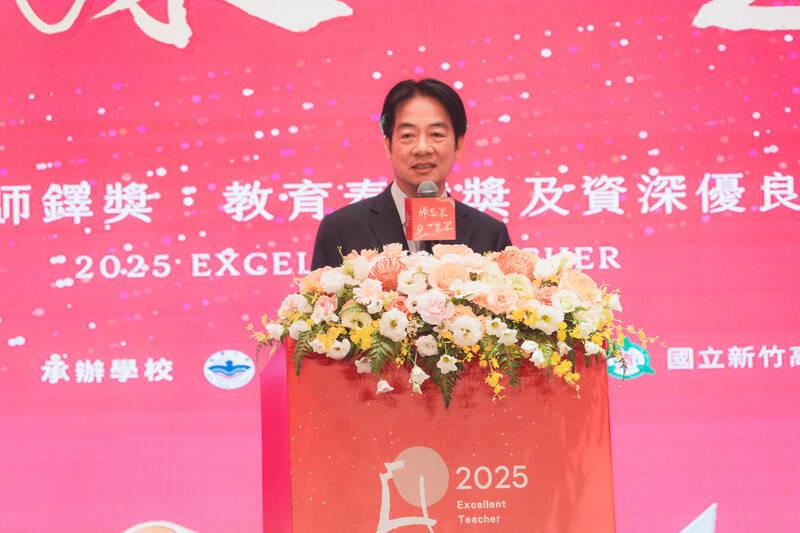President William Lai (賴清德) today laid out three key directions for education policy this year: promoting educational equality, ensuring holistic education that prioritizes emerging fields and sustaining investment in education.
He was speaking at the Ministry of Education’s National Excellent Teacher Awards in Taipei.
First, wide-reaching subsidies and benefits would promote educational equality, he said.

Photo courtesy of the Ministry of Education
School fees have been waived for public and private senior-high schools and vocational high schools, he said.
Moreover, students attending private universities could receive a subsidy of NT$35,000 (US$1,163) and students from low and middle-income backgrounds could receive an additional NT$20,000 and NT$15,000 respectively, Lai said.
Students could further receive monthly accommodation subsidies of NT$5000 for dormitories, while the government has rolled out a NT$30 billion subsidy program for private rented accommodation, which assists up to 790,000 people, he added.
The government has also made transportation benefits available, including TPass perks, while the ministry has funded dormitory renovations and construction projects at universities, he said.
Second, the government has promoted a holistic approach to education, investing in important knowledge for the future, such as artificial intelligence (AI) applications and carbon neutrality, Lai said.
The education system values individual differences among students and teaching methods have been tailored appropriately, inspiring children to reach their full potential while prioritizing balanced physical and mental development, he said.
Additionally, the government has encouraged high schools and universities to jointly design courses, including classes that teach AI and its applications to give students a head start in the field, Lai said.
Courses also include the net zero transition, to help students grasp the importance of carbon neutrality and understand how individuals, businesses and the nation as a whole can move toward good environmental, social and governance practices, he added.
Meanwhile, the “Youth Overseas Dream Fund” program, passed by the Executive Yuan in November last year, would award students up to NT$2 million to study sustainability abroad and bring knowledge of low-carbon policies to Taiwan, he said.
Third, the government would continue sustained investments in education, across elementary, junior-high and senior-high schools, and universities, he said.
Taiwan’s education budget is protected under law and annual spending must not fall below 23 percent of the average government revenue from the past three years, he said.
The Higher Education Sprout Project, already in its second phase, has a five-year budget of NT$97 billion, an increase of NT$13.2 billion compared with its first phase, Lai said.
The project, which began in 2023 and runs until 2027, provides subsidies to 138 universities and colleges to improve teaching quality, promote diversity, boost research capabilities and enhance industry-academia collaboration, he said.
Additional reporting by Rachel Lin

The Coast Guard Administration (CGA) yesterday said it had deployed patrol vessels to expel a China Coast Guard ship and a Chinese fishing boat near Pratas Island (Dongsha Island, 東沙群島) in the South China Sea. The China Coast Guard vessel was 28 nautical miles (52km) northeast of Pratas at 6:15am on Thursday, approaching the island’s restricted waters, which extend 24 nautical miles from its shoreline, the CGA’s Dongsha-Nansha Branch said in a statement. The Tainan, a 2,000-tonne cutter, was deployed by the CGA to shadow the Chinese ship, which left the area at 2:39pm on Friday, the statement said. At 6:31pm on Friday,

The Chinese People’s Liberation Army Navy’s (PLAN) third aircraft carrier, the Fujian, would pose a steep challenge to Taiwan’s ability to defend itself against a full-scale invasion, a defense expert said yesterday. Institute of National Defense and Security Research analyst Chieh Chung (揭仲) made the comment hours after the PLAN confirmed the carrier recently passed through the Taiwan Strait to conduct “scientific research tests and training missions” in the South China Sea. China has two carriers in operation — the Liaoning and the Shandong — with the Fujian undergoing sea trials. Although the PLAN needs time to train the Fujian’s air wing and

Taiwanese celebrities Hank Chen (陳漢典) and Lulu Huang (黃路梓茵) announced yesterday that they are planning to marry. Huang announced and posted photos of their engagement to her social media pages yesterday morning, joking that the pair were not just doing marketing for a new show, but “really getting married.” “We’ve decided to spend all of our future happy and hilarious moments together,” she wrote. The announcement, which was later confirmed by the talent agency they share, appeared to come as a surprise even to those around them, with veteran TV host Jacky Wu (吳宗憲) saying he was “totally taken aback” by the news. Huang,

The American Institute in Taiwan (AIT) put Taiwan in danger, Ma Ying-jeou Foundation director Hsiao Hsu-tsen (蕭旭岑) said yesterday, hours after the de facto US embassy said that Beijing had misinterpreted World War II-era documents to isolate Taiwan. The AIT’s comments harmed the Republic of China’s (ROC) national interests and contradicted a part of the “six assurances” stipulating that the US would not change its official position on Taiwan’s sovereignty, Hsiao said. The “six assurances,” which were given by then-US president Ronald Reagan to Taiwan in 1982, say that Washington would not set a date for ending arm sales to Taiwan, consult